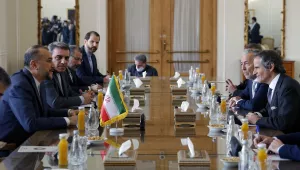Abstract
This paper is part of a larger project that examined how different stances on regional issues can impact bilateral U.S.-European relations.
Since the Soviet breakup and the subsequent independence of the states of the South Caucasus (Armenia, Azerbaijan, and Georgia), Europe and the United States have conducted very different policies toward the new states in the greater Caspian region. Moreover, Europe and the United States view Iran's policies and the desired role that Tehran should play in the region in diverging ways.
U.S. policy toward the region has evolved through three major changes since the Soviet breakup: 1991–1994, 1994–1998, and the present. Washington currently has military forces deployed there, indicating an intention to retain a presence in the greater Caspian region for a significant period of time. The U.S. goals that have remained constant toward the South Caucasus and the Caspian region include: Preserving the independence and security of the new states. Development of energy and transport lines on an east-west corridor. Denying Iran and other potential proliferators sources of technology, materials, and scientists in the new states which can be used to advance their WMD programs.
Since September 2001, the United States has seen the region as an important component in its anti-terrorism policy. Thus, most of its policy goals in the South Caucasus and greater Caspian region place Washington in juxtaposition to Iran.
Europe has taken very little interest in the South Caucasus and Caspian region; most of the European presence has been from energy companies that having leading roles in oil and gas projects. Recently, Europe seems to be committed to coordinating new initiatives in the region with the efforts of the United States and Russia, especially in the area of conflict resolution. What the appropriate role of Iran should be in both conflict resolution and future security arrangements in the region can bring the United States and Europe into disagreement.
Iran's policy in Central Asia and the Caucasus is based primarily on its own security and economic considerations. Domestic inputs and constraints—primarily the presence of a significant Azerbaijani minority in Iran—and its interests and confrontations beyond the region, including that with the United States, also influence Iran's policies toward the region.
The United States and Europe could diverge over the role that Iran should be assigned in peacemaking efforts in the region, especially the Nagorno-Karabagh conflict. Iran shares borders with all the conflict's parties, and its state interests are directly affected by the developments and outcomes. Despite its official declaration of neutrality, Iran's actions regarding the Nagorno-Karabagh conflict have been anything but.
Iran has been in the center of conflict over the Caspian Sea demarcation, usually by stalemating any proposed agreement. In June 2001, Iran instigated a crisis by sending gunboats to threaten a BP explorer vessel that was surveying an area of the Caspian Sea that was disputed between Azerbaijan and Iran. Iran then repeatedly violated Azerbaijani airspace. Tehran's policy on Caspian demarcation should be viewed as part of its wider policy of obstructing the development of a more prosperous and powerful Azerbaijan.
Tehran's policies toward Central Asia and the Caucasus are guided chiefly by material state considerations and not by regime ideology; thus, a change in regime may not cause a dramatic change in the policies toward the region. A regime change could bring a renewal of relations and cooperation with the United States that may lessen Washington's sensitivity to Iran's actions in the region, rendering the states of the South Caucasus more vulnerable to Iranian dictates.
Consequently, Europe and the United States may continue to diverge over the role of Iran in the Caspian region after a change of regime in Iran and subsequent improvement of its relations with the United States.
Shaffer, Brenda. “Iran's Role in the South Caucasus and Caspian Region: Diverging Views of the U.S. and Europe.” July 2003



